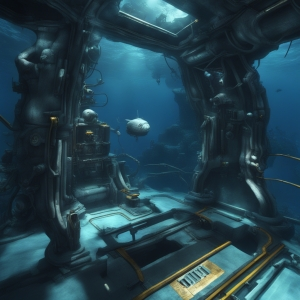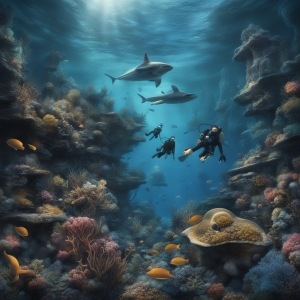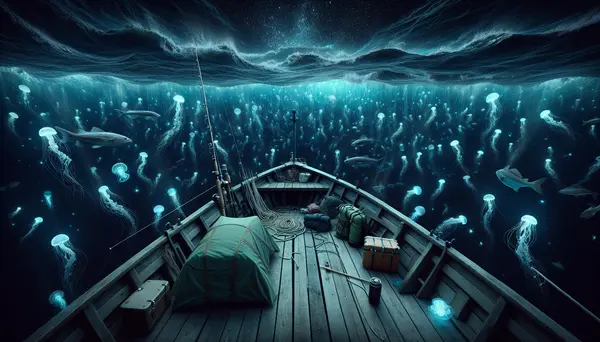Table of Contents:
Introduction: Deep-Sea Adventures and the Call of the Abyss
Many of us perceive the ocean as a vast, serene blanket of water. But there's more than meets the eye. Deep beneath the azure surface lies a world of mystery and intrigue, teeming with a myriad of creatures and phenomena often beyond our wildest imaginations. This is the world of deep-sea adventures, an unequaled exploration into the intricacies of oceanic life. This article offers an introduction to the exhilarating realm of deep-sea exploring. Whether you're an enthusiastic novice or an experienced deep-sea adventurer, you'll find value in unravelling the secrets of the abyss that we're about to plunge into.
Uncovering Mysteries: Why Are Deep-Sea Explorations Important?
The deep sea, which occupies nearly two-thirds of Earth's surface, remains largely unexplored, hiding countless mysteries beneath its surface. By embarking on deep-sea adventures, we gain a clearer picture of our planet's unique biodiversity, geological activity, and climate patterns. In other words, by unveiling the intricacies of the abyss, we are actually enriching our understanding of the world we live in.
The deep sea is a treasure trove of unique and often strange life forms. It houses countless species that have yet to be discovered. Terrifying carnivores, ethereal bioluminescent creatures, and alien-like beings reside in these murky depths, providing invaluable insight into how life can adapt to extreme conditions. Studying these life forms can potentially lead to medical, technological, and scientific breakthroughs. For example, deep-sea marine organisms are already being used in the development of new drugs.
Exploring the abyss also unveils vital clues about our planet's history and future. Many geologists and scientists are interested in deep-sea exploration because of the wealth of knowledge that lies on the deep sea floor. This includes information about Earth’s past climate and geological activity, preserved in layers of deep-sea sediment. Such information not only helps us understand how our planet has evolved, but it could also provide hints towards predicting future geological events and climate trends.
In summary, deep-sea exploration holds keys to revelations that not only satisfy our curiosity, but also carry profound implications for science, medicine, geology, and environmental studies. As an adventurer, your explorations contribute to this ripple effect of learning and discovery.
Pros and Cons of Deep Sea Exploration Adventures
| Pros | Cons |
|---|---|
| Discovering new species | Potential harm to deep-sea ecosystems |
| Experiencing the thrill of adventure | High cost of deep-sea exploration equipment |
| Understanding deep-sea ecosystems better | Risk of equipment failure at great depths |
| Potentially finding new resources | Dangers to human health due to intense pressure and low temperatures |
| Unveiling the mysteries of the abyss | Possible negative impact on undiscovered species |
Journey to the Depths: What Does It Take to Explore the Abyss?

Exploring the deep sea is not for the faint of heart. It requires both physical and mental preparation, along with an understanding of the unique challenges that await underwater. The harsh conditions of the deep sea, including extreme pressure, freezing temperatures, and lack of light, necessitate the use of specialized equipment.
Foremost on the equipment list for a deep-sea explorer is a deep-sea submersible. These specially designed vessels can withstand the immense pressure of the deep ocean, largely due to their strong hulls made from titanium and other robust materials. They're also equipped with powerful lights to illuminate the perpetual darkness, and high-definition cameras to capture images of the deep sea's enigmatic creatures.
Personal preparation is also paramount in deep-sea exploration. Deep-sea divers must undergo rigorous training to condition their bodies for the rigors of deep-sea diving. This includes, among other things, learning how to cope with potentially dangerous situations, such as sudden pressure changes. Additionally, divers need to learn to conserve oxygen and manage their dive time effectively to avoid decompression sickness, a potentially debilitating condition caused by resurfacing too quickly.
Finally, exploring the abyss would be incomplete without a sense of curiosity and respect for the ocean. The world beneath the waves has a distinctive beauty that deserves our appreciation and protection. With the right gear, preparedness, curiosity, and an appreciation for the ecosystems you’ll be plunging into, you will be well-equipped for an unforgettable deep-sea adventure.
Taking the Plunge: First Steps in Deep-Sea Exploration
Embarking on a deep-sea exploration journey may seem overwhelming at first, but with the right guidance and tools, this seemingly daunting task can turn into an awe-inspiring experience.Then, what are the fundamentals every novice deep-sea explorer should be aware of?
The first step is to gain sufficient knowledge about the deep sea and its unique environment. Reading extensive literature, following experts and their exploration endeavors, watching documentaries centered around the marvels of the deep sea can all pave the way towards a more comprehensive understanding of what you're about to dive into.
Choosing the right gear is a cardinal aspect of your preparations. Investing in a convenient, high-quality dry suit, specially designed for deep-sea dives will ensure your comfort and safety underwater. Moreover, reliable diving cylinders, dive computers, and buoyancy control devices are all essential equipment that a novice deep-sea explorer should procure.
Diving training is an absolute must for every beginner. You'll need to learn safety procedures, how to use your gear effectively, and ways to manage your physical efforts during your dives. Bear in mind that deep-sea diving is significantly different from recreational diving. Therefore, getting a deep dive certification from a recognized organization would be a worthy consideration.
Being mentally prepared is as significant as being physically prepared. Cultivating a clear understanding of the potential dangers and working towards overcoming the fear of these immense depths will help you approach your journey with an open yet focused mind.
Lastly, start small and then gradually work your way into deeper waters. It's vital to gain some initial experience before you push your boundaries. And remember, patience and respect for the ocean are virtues that every deep-sea explorer should possess.
Awaits Below: Wonders and Dangers in the Abyss

As we descend deeper into the ocean, we begin to encounter unparalleled wonders, but also grave dangers. The deep sea is home to an incredible variety of creatures and geological features. Many of these beings and sights can only be seen in this unique environment, making each deep-sea adventure a captivating and eye-opening experience.
You may witness the breathtaking, albeit ghostly spectacle of bioluminescent creatures like the anglerfish, jellyfish, and squid that produce their own light to navigate, communicate, and hunt in the pitch-black waters. Intriguing formations such as hydrothermal vents, sometimes known as 'black smokers', too can be observed. They spew out mineral-rich water at high temperatures, supporting some of the most extraordinary ecosystems on Earth. These ecosystems are home to specially-adapted organisms that thrive in such extreme conditions, triggering scientists' curiosity about the existence of life beyond Earth.
However, the journey into the abyss is not without dangers. Sharp, jagged rocks, and unwieldy underwater currents can pose potential threats. Erratic and violent sea creatures, camouflaged by the deep-sea darkness, may also lurk in the shadows. To weather these risks, adventurers must adhere to safety protocols and undergo thorough training in navigation and emergency response.
Yet, these risks are largely overshadowed by the sheer wonder and exhilaration that deep-sea exploration offers. The deep sea is one of the last frontiers of human exploration - a place where danger and beauty are two sides of the same coin. So, are you ready to face the mysteries of the abyss and embark on an unparalleled deep-sea adventure?
Preparation Tips: For A Successful Deep-Sea Adventure
Preparing for a deep-sea adventure is not just about the gear. It's about mental readiness and understanding your environment. Here are some crucial preparation tips to guide you for a successful exploration into the abyss.
Physical Fitness: With exploration comes exertion. Ensure that your fitness levels meet the demands of a deep-sea adventure. Regular cardiovascular exercises like swimming, jogging and cycling can help boost your endurance. Also, practicing breathing exercises can assist with managing oxygen consumption underwater.
Nutrition: Proper nutrition is vital to maintain energy levels during your adventure. Consume balanced meals with ample protein, carbohydrates and healthy fats to fuel your body. Stay well-hydrated and avoid alcohol prior to your expedition.
Know Your Limits: Deep-sea exploration comes with risks. Be familiar with the signs of hypothermia, decompression sickness and other potential health complications. Always be aware of your personal limits and do not push beyond them. The deep sea is a place for patience and prudence, not bravado.
Connect with Professionals: Networking with experienced deep-sea explorers can provide invaluable insights and enhance your preparation process. Consider joining ocean exploration communities or forums where you can interact with and learn from the veterans in this field.
Preserve the Environment: Remember, the deep sea is an ecosystem that deserves our utmost respect and protection. Avoid making any unnecessary disturbances to the environment during your adventure. Embrace the principle of 'take only pictures, leave only bubbles'.
With these preparation tips in mind, you're on your way to joining the ranks of the brave adventurers who've answered the call of the abyss. The deep sea is waiting to reveal its secrets to you, so prepare well, respect its wonders, and embark on the adventure of a lifetime.
Making the Most of Your Adventure: Tips for Deep-Sea Exploration

Now that you’re well-equipped with knowledge and ready to start your journey, here are some key tips to ensure that you get the most out of your deep-sea exploration adventure.
Plan Your Dive and Follow the Plan: Thorough and detailed planning before the dive helps to keep you safe. Enlist all necessary safety measures, emergency procedures, and checks for your equipment. Besides, adhere to your plan throughout your exploration. Spontaneity may seem tempting but can be dangerous.
Always Dive with a Buddy: Deep-sea exploration isn’t an activity to undertake single-handedly. Always make sure that you have a trustworthy, experienced partner. Not only it provides emotional support but also it’s a crucial safety measure.
Respect the Deep Sea Environment: Your exploration should always have a minimal impact on the marine life you encounter. Avoid touching or taking anything from the ocean floor, and be careful not to disturb the many creatures that call these depths home.
Use a Dive Computer: A dive computer is an essential tool in modern deep-sea exploration. It helps monitor things like the time, depth, and pressure - vital data when you're deep underwater.
Stay Within Your Limits: Although deep-sea exploration is about venturing into the unknown, it’s essential you know your own limits. Stick to the depths you're comfortable with and never exceed the limits of your training and experience.
By following these tips, not only will your deep-sea adventure be more enjoyable, but you'll also make sure you explore in a manner that's safe, respectful, and ultimately more rewarding. The ocean is calling, are you ready to answer?
Conclusion: The Thrill of Deep-Sea Adventures
In conclusion, the boundless allure of the deep-sea adventure lies in the intoxicating blend of discovery, science, and the undeniable thrill of exploring the unknown. There is a stark beauty in the deep-sea world, one that challenges and enriches our understanding of life on Earth. With the right preparation, you too can experience the mesmerizing allure of the abyss.
Deep-sea exploration is not simply a venture for thrill-seekers or scientists; it's a realm of wonder open to all who value curiosity and adventure. As we continue to explore the mysteries of the deep, we enhance our appreciation of the seas, develop a stronger sense of responsibility for its conservation, and generate profound insights that inspire advancements across various fields.
Your exploration might just be the beginning of the next big discovery or, at the very least, an unforgettable adventure that deeply connects you with the majestic and mysterious world beneath the waves. Whether you are diving into the ocean's depths, watching specialized equipment scan the seabed from a ship, or observing marine life in the deep from the safety of a submersible, the thrill of deep-sea adventures is a unique experience that promises an unparalleled sense of achievement and wonder.
Deep-Sea Exploration FAQs
What is deep-sea exploration?
Deep-sea exploration is the investigation and study of the deep ocean. It involves the use of various techniques and equipment to understand the physical, chemical, and biological aspects of the deep-sea environment.
Why is deep-sea exploration important?
Deep-sea exploration is crucial for expanding our knowledge about the planet. It leads to the discovery of new species, geological processes, and invaluable information about the impact of climate change on the oceans.
What challenges does deep-sea exploration face?
Deep-sea exploration is faced with numerous challenges including the extreme pressure, cold temperatures, and the darkness that make the deep ocean a difficult environment to explore and study.
What technologies are used in deep-sea exploration?
Various technologies like sonar mapping systems, remotely operated vehicles (ROVs), automated underwater vehicles (AUVs), deep-sea submersibles, and satellite technologies are used in deep-sea exploration.
How deep have humans explored the ocean?
The deepest part of the ocean, the Challenger Deep in the Mariana Trench, has been reached by humans. In 2012, filmmaker James Cameron descended about 11 kilometers (6.8 miles) to the bottom of the Pacific Ocean's trench in a solo submarine mission.







